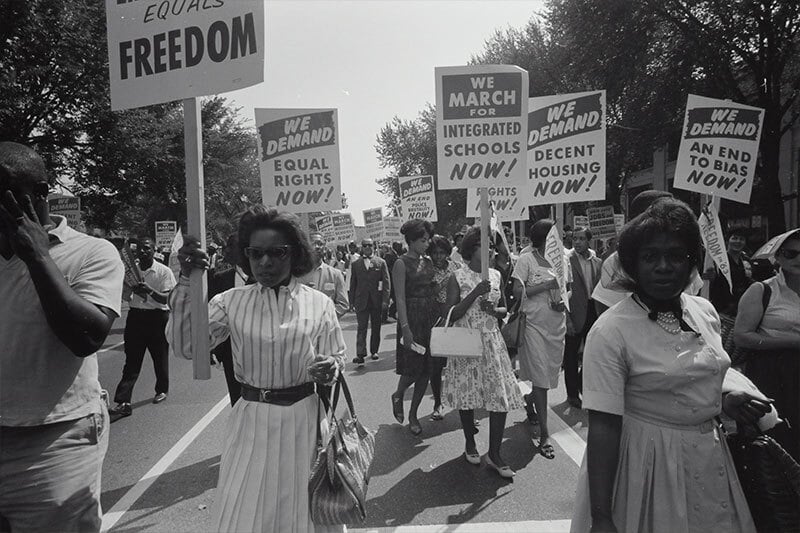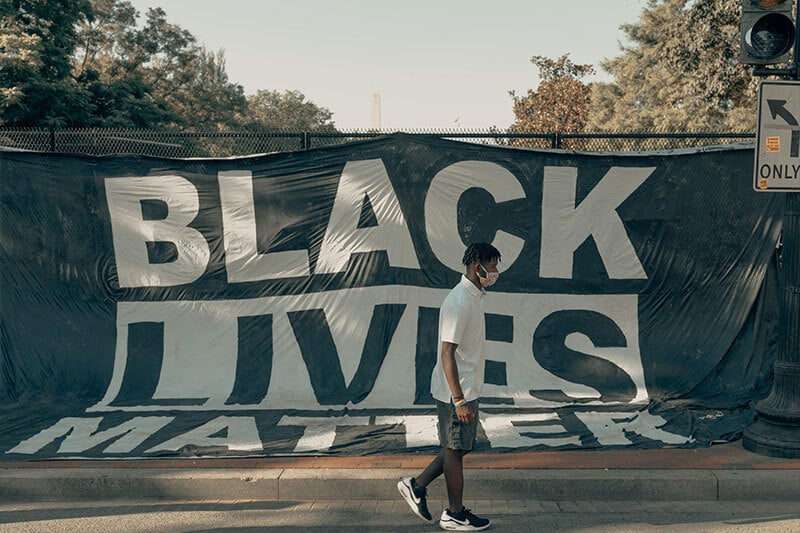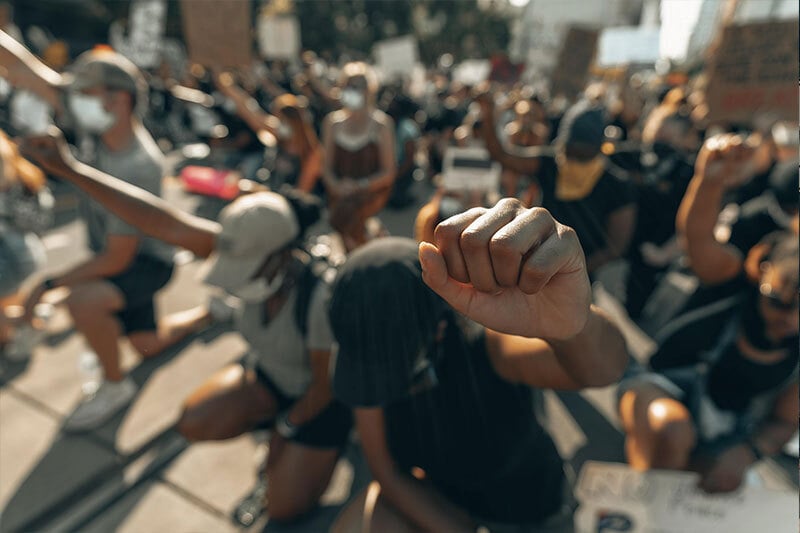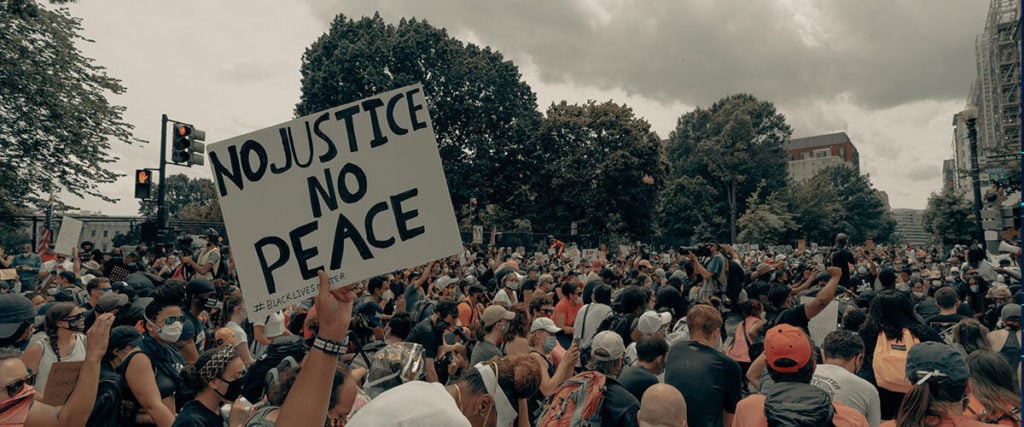From Langston Hughes to Warsan Shire, here are 7 moving poems about the trials of racial discrimination and injustice, written by poets of colour.
As mainstream media begins to slacken its coverage of the Black Lives Matter protests that are taking place across the world, the movement continues to rage as people of colour demand that their stories be heard. With many veterans of activism telling tales of civil rights protests that date back to our grandparents’ generation, it’s clear that there’s a serious need for systemic change in the world’s approach to racism – and it needed to happen yesterday.
We’ve curated a list of incredibly powerful poems that depict both the internal and external struggles of being a person of colour, from 1926 to today, with hopes that they will inspire, uplift, and stir people to action.
You’re Not Black – Amy Saunders
I sit with them at lunch
Fried chicken on my plate
I eat with a knife and fork
“You’re not black, if you don’t use your hands to eat”
Yet I know that hands tied up the strange fruit on the trees in the south
The fruit for the crows to pluck
For the rain to gather, for the wind to suck
For the sun to rot, for the trees to drop*
I don’t recognise the Caribbean music, or the Afrobeats
I only know of Liszt, Chopin and Ludovico Einaudi
Whose names you’ve probably never heard
“You’re not black, if you don’t know this beat”
Yet, I am familiar with the beat of pounding
Pounding of sugar cane, the whipping of backs
The cries and screams of my ancestors
Ring loud in my head centuries later
So how dare you? How dare you put me down!
Question my ethnicity, I’m still a shade of brown
And I’m sorry if I don’t live up to your ‘black norms’
But I live in a world with segregated dorms
Society crushes me, tells me I’m ugly
But copies my features, they must think it’s funny
I’m not trying to in any way be mean
But I live in a society covered in white sheen
Sorry to Bother You, but I should Get Out
’Cause The Hate U Give leaves me with no doubt
That I am not The Help, the help that you need
But the Hidden Figures are clear to see
That I should stop trying to be ‘Black’ and just try to be
Me
*from ‘Strange Fruit’ by Abel Meeropol
A top 15 winner of the Foyle Young Poets of the Year Award 2019, Amy Saunders was only 13 years old when she wrote You’re Not Black, a poem that conveys the internal struggle of being a black person that feels like they’re on the outside of their culture looking in. Challenging the normalised ideas of what it means to be black, Amy uses excerpts from a song by Billie Holiday called ‘Strange Fruit’, originally written by Abel Meeropol in 1939 to protest against lynchings in America. She also makes clever references to popular, thought-provoking movies about racism, like Get Out, The Help, and Hidden Figures, which all emotively touch on the injustice that people of colour have faced generation after generation.

I, Too (1926) – Langston Hughes
I, too, sing America.
I am the darker brother.
They send me to eat in the kitchen
When company comes,
But I laugh,
And eat well,
And grow strong.
Tomorrow,
I’ll be at the table
When company comes.
Nobody’ll dare
Say to me,
“Eat in the kitchen,”
Then.
Besides,
They’ll see how beautiful I am
And be ashamed—
I, too, am America.
Born in 1902, Langston Hughes was an African American poet, social activist, novelist, and playwright. He wrote I, Too to illustrate the ostracisation he faced throughout his life, feeling as though he were constantly being pushed to the outer edges of society, a society run by the white majority. Known for conveying the good and the bad of life as an African American in the early 1900’s, Hughes was an intellectual who fought to portray the reality of life as a black person. Having grown up with a father who’d rejected his own people, Hughes became a significant figure for his honest work in literature as he strived to honour the real trials and tribulations that black people in America go through.

Immigrant Blues – Li-Young Lee
People have been trying to kill me since I was born,
a man tells his son, trying to explain
the wisdom of learning a second tongue.
It’s an old story from the previous century
about my father and me.
The same old story from yesterday morning
about me and my son.
It’s called “Survival Strategies
and the Melancholy of Racial Assimilation.”
It’s called “Psychological Paradigms of Displaced Persons,”
called “The Child Who’d Rather Play than Study.”
Practice until you feel
the language inside you, says the man.
But what does he know about inside and outside,
my father who was spared nothing
in spite of the languages he used?
And me, confused about the flesh and the soul,
who asked once into a telephone,
Am I inside you?
You’re always inside me, a woman answered,
at peace with the body’s finitude,
at peace with the soul’s disregard
of space and time.
Am I inside you? I asked once
lying between her legs, confused
about the body and the heart.
If you don’t believe you’re inside me, you’re not,
she answered, at peace with the body’s greed,
at peace with the heart’s bewilderment.
It’s an ancient story from yesterday evening
called “Patterns of Love in Peoples of Diaspora,”
called “Loss of the Homeplace
and the Defilement of the Beloved,”
called “I want to Sing but I Don’t Know Any Songs.”
Born in 1957 to Chinese political exiles, Li-Young Lee lived in Indonesia in a time when anti-Chinese sentiment spread throughout the country. As a result, his own father was held as a political prisoner, and after a year of being held captive, Lee and his family fled to the United States in 1964. Li-Young Lee’s poem, Immigrant Blues, is about the feelings of displacement and a lack of belonging that many immigrants struggle with, as a result of feeling disconnected from the rich culture they were born into, before being ripped away because of politics and systemic racism.

Home – Warsan Shire
no one leaves home unless
home is the mouth of a shark
you only run for the border
when you see the whole city running as well
your neighbors running faster than you
breath bloody in their throats
the boy you went to school with
who kissed you dizzy behind the old tin factory
is holding a gun bigger than his body
you only leave home
when home won’t let you stay.
no one leaves home unless home chases you
fire under feet
hot blood in your belly
it’s not something you ever thought of doing
until the blade burnt threats into
your neck
and even then you carried the anthem under
your breath
only tearing up your passport in an airport toilet
sobbing as each mouthful of paper
made it clear that you wouldn’t be going back.
you have to understand,
that no one puts their children in a boat
unless the water is safer than the land
no one burns their palms
under trains
beneath carriages
no one spends days and nights in the stomach of a truck
feeding on newspaper unless the miles travelled
means something more than journey.
no one crawls under fences
no one wants to be beaten
pitied
no one chooses refugee camps
or strip searches where your
body is left aching
or prison,
because prison is safer
than a city of fire
and one prison guard
in the night
is better than a truckload
of men who look like your father
no one could take it
no one could stomach it
no one skin would be tough enough
the
go home blacks
refugees
dirty immigrants
asylum seekers
sucking our country dry
niggers with their hands out
they smell strange
savage
messed up their country and now they want
to mess ours up
how do the words
the dirty looks
roll off your backs
maybe because the blow is softer
than a limb torn off
or the words are more tender
than fourteen men between
your legs
or the insults are easier
to swallow
than rubble
than bone
than your child body
in pieces.
i want to go home,
but home is the mouth of a shark
home is the barrel of the gun
and no one would leave home
unless home chased you to the shore
unless home told you
to quicken your legs
leave your clothes behind
crawl through the desert
wade through the oceans
drown
save
be hunger
beg
forget pride
your survival is more important
no one leaves home until home is a sweaty voice in your ear
saying-
leave,
run away from me now
i don’t know what i’ve become
but i know that anywhere
is safer than here
A heartbreaking piece about the ongoing humanitarian crisis faced by at least 79.5 million people who are refugees with no home to return to, Home was written by Warsan Shire in 2017. Awarded the inaugural Brunel University African Poetry Prize in 2013, Shire is a woman of colour who was born to Somali parents and raised in London. Her work often connects the complicated intricacies of race, culture and war as she strives to depict the displacement that numerous people of colour have to live with.

Caged Bird (1983) – Maya Angelou
A free bird leaps
on the back of the wind
and floats downstream
till the current ends
and dips his wing
in the orange sun rays
and dares to claim the sky.
But a bird that stalks
down his narrow cage
can seldom see through
his bars of rage
his wings are clipped and
his feet are tied
so he opens his throat to sing.
The caged bird sings
with a fearful trill
of things unknown
but longed for still
and his tune is heard
on the distant hill
for the caged bird
sings of freedom.
The free bird thinks of another breeze
and the trade winds soft through the sighing trees
and the fat worms waiting on a dawn bright lawn
and he names the sky his own
But a caged bird stands on the grave of dreams
his shadow shouts on a nightmare scream
his wings are clipped and his feet are tied
so he opens his throat to sing.
The caged bird sings
with a fearful trill
of things unknown
but longed for still
and his tune is heard
on the distant hill
for the caged bird
sings of freedom.
Maya Angelou was a civil rights activist who worked with Dr Martin Luther King, Jr. and Malcolm X. Born in 1928, Angelou’s early years were riddled with trauma, as she experienced abuse and death that left her unable to speak for five years. As she grew older, despite being mute, Angelou developed a love for language. After she found her voice again, Maya Angelou went on to become an inspirational figure across America for her honest work as a poet, storyteller, and autobiographer. She was also Hollywood’s first black female director, and a professor of American Studies. Speaking with courage and from the heart, Maya Angelou accurately depicted the turmoil and abuse that her country people faced throughout the civil rights movement.
After Zuko (2019) – Dave Harris
Yes, I too have known fire. And yes,
I too have wondered if I come from
a burnt people. A people who have always
been ablaze. I have hated my own hands.
I have been prince to a kingdom of folk
and dishonored them. I have worn a white mask.
I have cut my hair to look less like me. I too
have sought to be anything other than the ashes
of another man’s sin. I have tried to earn my existence
in a nation that would not claim me. I have scorched
the ones who care most. I have searched the countryside
to find something I always had. And yes,
I have been unworthy of my mother’s love.
I have known the right thing to do and done
otherwise. I too have been an exile and a product
of my tribe. Yes, I am still running.
I too am afraid of being a good man. I too
have been beaten by water. Nearly drowned. Emerged.
And still, I would burn a forest down
just to feel the warmth against my skin.
From his book entitled Patricide, After Zuko is a poem that references a character from Avatar: The Last Airbender. Zuko is from Fire Nation, a place in this fictional world whose citizens are able to bend and manipulate fire. In this clever piece about a black man’s difficulty to grapple with his identity and masculinity, Harris aptly references the popular fictional show as a way to explain his struggle with being a black person in a country that openly accepts white people, but treats people of colour with disdain. Originally from West Philadelphia, Harris is a poet and playwright who graduated from Yale University.
Rosa (1998) – Rita Dove
How she sat there,
the time right inside a place
so wrong it was ready.
That trim name with
its dream of a bench
to rest on. Her sensible coat.
Doing nothing was the doing:
the clean flame of her gaze
carved by a camera flash.
How she stood up
when they bent down to retrieve
her purse. That courtesy.
A poem about Rosa Parks, the woman known for bravely protesting against racial segregation, Rosa aims to zero in on the moment in which Rosa Parks performed a simple, yet world-changing, act of defiance that set a historical string of events in motion. Rosa Parks sat at the front of a bus, something that only white Americans were allowed to do at the time. When she was asked to move, she replied with a curt “No”, which resulted in her arrest, and a slew of protests across the country. As the first African-American to become Poet Laureate Consultant in Poetry to the Library of Congress, Rita Dove is an advocate for the power of poetry, who won a Pulitzer Prize for the semi-autobiographical novel she wrote about her grandparents, Thomas and Beulah.
Related Articles
7 Inspirational Poems for Women About Resilience
12 Best Motivational Movies for Entrepreneurs
Embrace: Photography Project Celebrates Gender Identity & Authenticity





